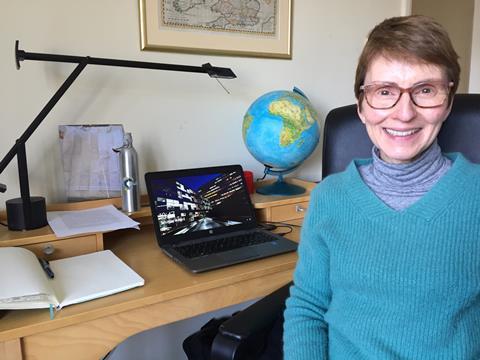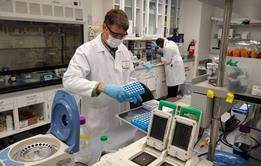A former space-travelling chemist finds she has to rejig her work here on Earth as a science communicator

During this difficult time, Chemistry World will be checking in with chemists around the globe to see how they are weathering the Covid-19 pandemic.
Helen Sharman, who became the first British astronaut in 1991, now works in science communication and finds the pandemic has significantly changed her job.
Sharman works part-time for Imperial College London, UK, and normally travels to schools around the country to encourage students to study scientific disciplines and eventually pursue them at university. ‘That is still my job, except I can’t now go out into schools,’ she says. ‘I’m rejigging a lot of what I would have talked about to see if I can condense that into various different forms that I can communicate remotely.’
The rest of Sharman’s work is freelance, talking to various audiences around the world about spaceflight science. Those gigs are now cancelled, leaving free time for voluntary work. This includes recording answers to questions for local schools to help students to think about science in different ways.
‘There are lots of things I can do now that I wouldn’t necessarily have been able to have done had I not had a lot of my work cancelled on me,’ Sharman says. ‘So, silver linings, I suppose.’
Home world
All UK universities, including Imperial, have closed their campuses to activities not essential to stopping Covid-19. This hasn’t caused Sharman any major problems. ‘I can [meet people] remotely,’ she says. ‘I can prepare my talks, I can use Imperial’s website and networks, so I don’t actually need to be in the college.’
The big difference, however, is in her freelance work, which had her out and about. ‘I am sitting in my little makeshift office at home, with my laptop in front of me and a phone at my side, and that’s quite different than being very physically mobile – on trains travelling all around the country, walking down a stage and around an organisation, meeting different people,’ Sharman says.
She already misses the feedback and interaction from audiences and organisations. She also misses friends, the mountains and walks along the River Thames – which is near her house but is much too crowded to go near these days.
But Sharman has fallen into a routine that works. She goes out for a run in her local park first thing every morning and does mat exercises in the afternoons to keep supple. She also finds it important to move away from the computer at regular intervals, and uses these opportunities to tackle household chores like sorting laundry. ‘I can make best use of my time and really integrate my working life with my home life,’ she says.
Space to think
Being sequestered at home brings Sharman back to her space days, when life stretched out endlessly and she took great comfort in gazing out of the window. Now, stuck in one location on Earth – specifically West London – she still enjoys this. ‘I like looking out and seeing the way the sun changes as the day goes by … I like looking at nature and how that changes.’ Just having that ability to take stock is nice, she says, given that life is usually very busy.
Appreciating free will is another thing Sharman learned in space that is proving useful right now. Up in orbit, Mission Control scheduled her days completely, so she began to take pleasure in little things like choosing what to eat or drink.
‘We might feel that our governments are controlling us by saying we are not allowed to go outside … but we still have bits of control over our lives, and that will help us get through this,’ she says. ‘I relish all the little aspects of control, like whether to go for a run at 6 o’clock in the morning or leave it until later… what day to do my shopping, or what books to read.’
Communication is also not to be undervalued. In space, Sharman could only talk to loved ones through a radio, so right now she appreciates being able to reach friends and family at any time via phone or video chat – although she has yet to convince her mom to do the latter.
She won’t mind continuing this inert existence for a few months, even with no obvious end in sight, because there is a good reason for it. ‘I didn’t mind being inside a spacecraft because I was there to be really useful doing experiments, and the aim was to improve science and to benefit the world,’ she says. ‘There is a fabulous overarching purpose for us all to stay indoors now, and that is to save lives.’
Chemists amid coronavirus

How chemists around the world are coping with life and work during the Covid-19 pandemic
- 1
- 2
- 3
- 4
 Currently
reading
Currently
reading
Chemists amid coronavirus: Helen Sharman
- 6
- 7
- 8
- 9
- 10
- 11
- 12
- 13
- 14
- 15
- 16
- 17
- 18
- 19
- 20
- 21
- 22
- 23
- 24
- 25
- 26
- 27
- 28
- 29
- 30
- 31
- 32
- 33
- 34
- 35
- 36
- 37
- 38
- 39
- 40



























































































No comments yet